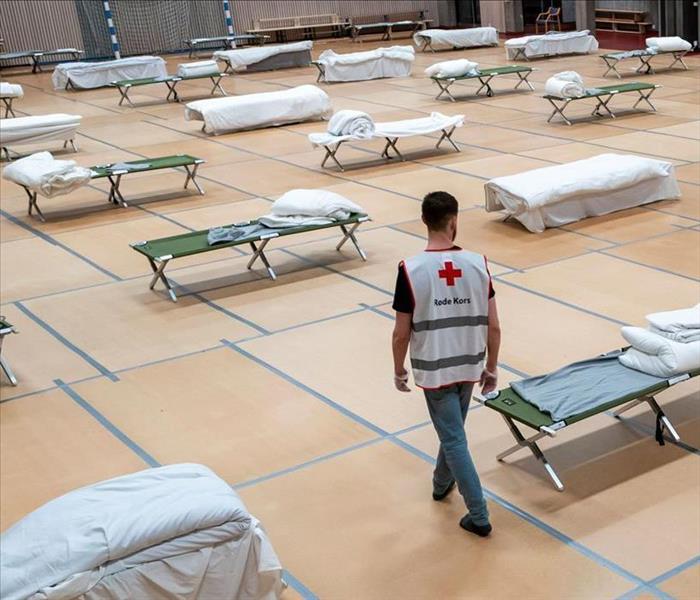Going to a Shelter in the Event of a Hurricane
6/15/2021 (Permalink)
 Hurricane shelters are taking the current pandemic into consideration when setting up in the event of a hurricane.
Hurricane shelters are taking the current pandemic into consideration when setting up in the event of a hurricane.
Going through an emergency situation, such as a hurricane, that requires you to evacuate your home can be very scary. Fortunately, proper preparation makes the process easier for everyone involved. While many steps in the replacement process may seem common knowledge, in the heat of the moment, there are things that can be forgotten. The following guide walks you through tips to use if you need to evacuate your home to go to a shelter during a hurricane.
Reduce the Risk of Catching COVID-19
One of the most important things you can do to prepare for potential relocation during a hurricane is to get the COVID-19 vaccine in advance. When you’re in a storm shelter, there are often many people in a confined space. This means the transmission of the virus will be much higher than if you were merely out and about doing your normal daily activities. The COVID-19 vaccine is taken in two separate doses and requires a brief window between the two doses, so getting started with the vaccine process as quickly as possible is essential.
Determine Where the Closest Shelter is Located
When evacuations occur, many people become frantic because there are so many things they need to do to prepare for their shelter stay. Taking the time to find out where your closest shelter is before any hurricanes arrive can take away some of the stress that comes during this hectic time. It’s a good idea to determine a safe route of travel in advance too. You want to be sure you don't have to travel through any roads that could potentially flood during a hurricane. This ensures you and your family can get to safety as quickly as possible.
Don’t Forget About Your Pets
Many shelters restrict pets from being able to stay on the premises for their safety and the safety of others on site. It’s important to make arrangements for your pets in advance so you have a safe place to take them if you do need to evacuate your home in the future. There are many kennels that house pets during emergency situations, but they often have limited capacity available. Making arrangements ahead of time betters your chances of being able to get them to a safe place during an emergency.
Talk to Your Family about a Potential Evacuation
The evacuation process can be scary for children so talking to them about what to expect before a hurricane hits can make the transition easier for them and for you. Explain the process that will take place and what they can expect at the shelter. Explain that there will be a lot of people in the facility and they need to stay with the family at all times. Explain how important it is to wash their hands frequently to prevent the transmission of any illness, including COVID-19. Explain that there will be very limited things for them to do to stay occupied so they need to determine what items they want to bring with them for entertainment.
Create a Checklist
It’s a good idea to create a checklist for the things that need to be brought to the shelter. A few things to consider bringing are:
- Water: While emergency shelters often have water available, the quantity may be limited and it could take a few days for emergency supplies to arrive. Packing water for your family ensures everyone can stay hydrated during the stay.
- Food: If anyone has dietary restrictions, bringing food with you ensures they get the specific foods they need. It’s a good idea to bring foods that are precooked and easily eaten without needing to be heated. It’s also a good idea to pack a few comfort foods, such as snacks, cookies, or fruit so everyone can feel as comfortable as possible.
- Medications: When staying in the shelter, you won’t have access to a pharmacy and thus need to bring any medications your family needs with you. Be sure to bring ice packs and a cooler for any medications that need to be refrigerated and refrigeration may be limited.
- Clothing: Clothing needs to be brought with you to the shelter as you may not be able to return to your home for a few days. It’s best to try to pack clothes in the most compact way possible as the amount of space designated for your family will be limited.
- Sleeping Bags: The number of cots available to shelter attendees will be limited. Bringing sleeping bags with you to the shelter ensures everyone in your family has a warm place to rest.
- Crucial Paperwork: Bring all important documentation with you when you evacuate. If something happens to your home during the hurricane, you can rest assured the important documents your family needs do not get damaged or destroyed.
- Entertainment: Staying in a shelter can become boring over time. Bringing card games, books or other forms of entertainment can help keep boredom away. It’s important to not rely solely on electronic devices for entertainment. Access to electricity may be limited and make it difficult to charge devices when needed.
Local storm shelters in central Florida can be found in Orange County at Barnett Park Community Center, in Seminole County at Northland Church, in Volusia at Ocean Center, and in Osceola County, the listings are provided when an emergency occurs. If a hurricane does damage your home, SERVPRO is ready and willing to get your home back in order so your family can return to normal life as quickly as possible.





 24/7 Emergency Service
24/7 Emergency Service